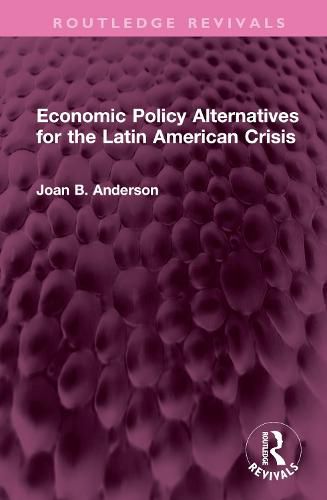Readings Newsletter
Become a Readings Member to make your shopping experience even easier.
Sign in or sign up for free!
You’re not far away from qualifying for FREE standard shipping within Australia
You’ve qualified for FREE standard shipping within Australia
The cart is loading…






First Published in 1990 Economic Policy Alternatives for the Latin American Crisis aims to explore macroeconomic policy alternatives available to Latin American policymakers from both a theoretical and an empirical perspective. Three decades of sustained growth and dramatic gains in levels of economic development in Latin America ended in the 1980s. Latin American countries found themselves plagued by foreign debts, high real interest rates, accelerated inflation, increasing poverty with malnutrition and high unemployment. This book presents a quantitative framework in which to evaluate the effectiveness of various types of monetary and fiscal policies under the conditions of inflation, declining growth, and debt. A macroeconomic policy model is constructed and using data from Ecuador the model is estimated empirically. The results of these simulations suggest some promising policy options to replace the current policy.
This book is an interesting read for scholars and researchers of Latin American economics, macroeconomics and development economics.
$9.00 standard shipping within Australia
FREE standard shipping within Australia for orders over $100.00
Express & International shipping calculated at checkout
First Published in 1990 Economic Policy Alternatives for the Latin American Crisis aims to explore macroeconomic policy alternatives available to Latin American policymakers from both a theoretical and an empirical perspective. Three decades of sustained growth and dramatic gains in levels of economic development in Latin America ended in the 1980s. Latin American countries found themselves plagued by foreign debts, high real interest rates, accelerated inflation, increasing poverty with malnutrition and high unemployment. This book presents a quantitative framework in which to evaluate the effectiveness of various types of monetary and fiscal policies under the conditions of inflation, declining growth, and debt. A macroeconomic policy model is constructed and using data from Ecuador the model is estimated empirically. The results of these simulations suggest some promising policy options to replace the current policy.
This book is an interesting read for scholars and researchers of Latin American economics, macroeconomics and development economics.